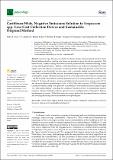Caribbean-Wide, Negative Emissions Solution to Sargassum spp. Low-Cost Collection Device and Sustainable Disposal Method
Author(s)
Gray, Luke A.; Bisonó León, Andres G.; Rojas, Folkers E.; Veroneau, Samuel S.; Slocum, Alexander H.
Downloadphycology-01-00004-v2.pdf (6.194Mb)
Publisher with Creative Commons License
Publisher with Creative Commons License
Creative Commons Attribution
Terms of use
Metadata
Show full item recordAbstract
<i>Sargassum</i> spp. blooms exacerbated by climate change and agricultural runoff are inundating Caribbean beaches, emitting toxic fumes and greenhouse gases through decomposition. This hurts tourism, artisanal fishing, shore-based industry, human health, standards-of-living, coastal ecology, and the global climate. Barriers, collection machinery, and <i>Sargassum</i> valorization have been unable to provide sufficient, sustainable, or widespread relief. This article presents a total <i>Sargassum</i> management system that is effective, low-impact, and economically scalable across the Caribbean. Littoral Collection Modules (LCMs), attached to artisanal fishing boats, collect <i>Sargassum</i> in nets which are brought to a barge. When full, the barge is towed to the deep ocean where <i>Sargassum</i> is pumped to ~150–200 m depth, whereafter it continues sinking (<i>Sargassum</i> Ocean Sequestration of Carbon; “SOS Carbon”). Costing and negative emissions calculations for this system show cleanup costs <$1/m<sup>3</sup> and emissions reduction potential up to 1.356 → 3.029 tCO2e/dmt <i>Sargassum</i>. COVID-19 decimated Caribbean tourism, adding to the pressures of indebtedness and natural disasters facing the region. The “SOS Carbon strategy” could help the Caribbean “build back better” by establishing a negative emissions industry that builds resilience against <i>Sargassum</i> and flight shame (“flygskam”). Employing fishermen to operate LCMs achieves socioeconomic goals while increasing <i>Sargassum</i> cleanup and avoiding landfilling achieves sustainable development goals.
Date issued
2021-08-12Department
Massachusetts Institute of Technology. Department of Mechanical EngineeringPublisher
Multidisciplinary Digital Publishing Institute
Citation
Phycology 1 (1): 49-75 (2021)
Version: Final published version